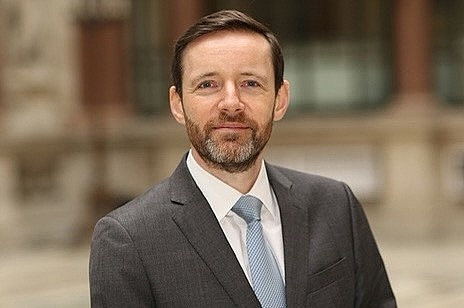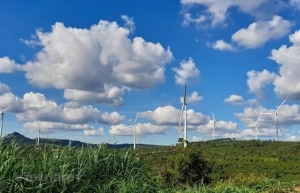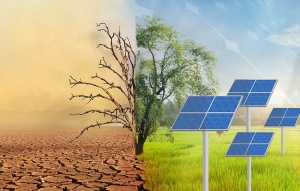Vietnam, UK expand climate change cooperation
The UK is committed to reducing emissions to 51 per cent below 1990 levels by 2025, and reaching net-zero emissions by 2050. What action is the UK undertaking to reach these targets? What lessons could Vietnam learn from the UK?
 |
| Iain Frew, British Ambassador to Vietnam |
The UK was the first country to bring in a legally binding emissions reduction target with the UK Climate Change Act back in 2008. The act not only created targets, but also put in place a framework to ensure the UK government acts on those targets from now until 2050. This law covers both reducing greenhouse gases and adapting to climate change impacts. This legislation provides an important reference point for governments of all countries, including Vietnam – long-term thinking and action is needed for a challenge as big as climate change.
The UK’s action on climate change includes significantly investing in renewables like wind and solar. Last year, those power sources contributed over 36 per cent of generation to our electricity grid. Thanks to this, we are due to fully phase out coal in the power sector later this year – this is remarkable given the history of the UK, the birthplace of the coal-powered Industrial Revolution.
Another important lesson from the UK experience is involving the private sector. The Climate Change Act and our net-zero target send a strong signal to businesses that they will need to innovate and reduce their emissions over the coming decades. We directly incentivise industries to reduce their emissions by putting a price on carbon via our Emissions Trading System. The UK is also a centre for green finance, which is helping to mobilise private finance towards sustainable projects through innovations like green bonds.
Vietnam and the UK have agreed to expand climate collaboration. Could you share more about the performance of related programmes and their impacts in the Southeast Asian nation?
The UK is proud to co-lead Vietnam’s Just Energy Transition Partnership (JETP) with the EU, alongside our partners Canada, Denmark, France, Germany, Italy, Japan, Norway, the United States, and 11 international Glasgow Financial Alliance for Net Zero banks.
The aim is for the JETP to mobilise $15.5 billion to support Vietnam’s energy transition. We hope that by also supporting policy reform and the enabling environment, it will unlock even more green finance, enabling Vietnam to achieve its ambitious net-zero goals.
The JETP is now in an exciting phase. Its Resource Mobilisation Plan was released in December, and the UK is supporting the JETP Secretariat to implement the plan through our UK Partnering for Accelerated Climate Transitions (UK PACT) programme. Our priority now is to identify the first projects to get JETP funding, which could be things like improving the energy grid in a province or building solar farms.
The UK PACT programme is also working on green finance with the Ministry of Planning and Investment and the State Securities Commission. We are supporting the development of a new environmental, social and governance framework so that businesses can understand and report their climate-related financial risk more effectively. We will be expanding UK PACT in Vietnam over the next few years, with further work in the energy, agriculture, and green finance sectors.
Another interesting UK programme is the Climate Finance Accelerator. This initiative helps low-carbon businesses attract investment through training from green finance experts. So far, we have worked with 20 businesses in Vietnam, and we hope the lessons learned will enable more Vietnamese businesses to roll out their innovative ideas and secure private investment.
Climate change is increasingly affecting countries in the Lower Mekong, which is attracting more stakeholders’ engagement. Should there be a common mechanism to coordinate stakeholder engagement and regional cooperation?
The climate risks in the Lower Mekong Delta are huge – the World Bank estimates that if we do nothing, 40 per cent of it could disappear underwater by 2050. This would obviously have devastating social, economic, and environmental impacts for Vietnam. To take meaningful action we need international partners, the national government, provinces, communities, and farmers to work together. Coordination between everyone can be challenging, but it is essential.
The World Bank’s Mekong Delta Working Group involves various government and international partners, and this has the potential to be a crucial tool in tackling the coordination challenge in the Lower Mekong region. Nevertheless, more needs to be done to pool resources, share knowledge, distribute and align work, and track progress against our goals. The UK would be a very supportive member of further coordination efforts for this region.
What climate actions should Southeast Asia prioritise?
The countries of Southeast Asia share common challenges in terms of climate adaptation, as the temperature goes up they all face extreme heat, rainfall, and sea-level rise. As fast-growing economies, meeting their emissions reductions commitments will also be challenging. However, the changes needed to build a resilient and low-carbon future have huge benefits for health, nature, and businesses. The climate transition also offers opportunities for the countries of Southeast Asia.
Tackling this challenge – and realising this opportunity – will require significant action in every sector, so it is hard to prioritise. However, energy is a big emitter in the region, so transitioning to low-carbon sources is extremely important. Infrastructure and buildings will be key to this, with green investments now paying off over the decades ahead.
Low-carbon public transport also comes to mind, as it can have a triple benefit by improving people’s health, lifestyles (with less time spent commuting), and reducing emissions. And we should not forget the land that underpins all economies – promoting sustainable agriculture and forestry practices can reduce emissions while also providing natural solutions to the impacts of climate change like flooding, landslides, and droughts.
To help with the challenge in the region, the UK is working closely with ASEAN, having signed the ASEAN–UK Plan of Action in 2022. The £110 million ASEAN Catalytic Green Finance Facility supports the development of sustainable and resilient infrastructure, such as renewable energy, clean transportation, or urban infrastructure.
We are now developing plans for a new multi-year climate programme, which will build on previous UK support around issues such as green finance and energy demand to support a green transition in ASEAN, including Vietnam.
 | EU and France provide $78.5 million for Quang Nam and Quang Tri to tackle climate change The central provinces of Quang Nam and Quang Tri will receive financial support worth €72.3 million ($78.5 million) from the EU and France to tackle the impacts of climate change. |
 | Renewable energy – leading solution to climate change mitigation in ASEAN Investing in renewable energy sources is as a palliative measure for ASEAN to mitigate climate change, according to Vice President of Infrastructure Solutions at Malaysian-based Vertiv Chee Hoe Ling. |
 | Australia strengthens climate and energy cooperation with Vietnam Australia's Assistant Minister for Climate Change and Energy Jenny McAllister will travel to Vietnam to drive cooperation on climate and the energy transition under the recently signed Comprehensive Strategic Partnership and Australia’s Southeast Asia Economic Strategy to 2040. |
 | Canada, ASEAN consolidate climate change response, economic cooperation The Canada-ASEAN Business Council (CABC) and the ASEAN Alliance on Carbon Markets (AACM) have signed a Memorandum of Understanding (MoU) to strengthen collaboration and accelerate the implementation of carbon crediting programmes across Southeast Asia. |
What the stars mean:
★ Poor ★ ★ Promising ★★★ Good ★★★★ Very good ★★★★★ Exceptional
Themes: COP26 - Together for Our Planet
Related Contents
Latest News
More News
- $100 million initiative launched to protect forests and boost rural incomes (January 30, 2026 | 15:18)
- Trung Nam-Sideros River consortium wins bid for LNG venture (January 30, 2026 | 11:16)
- Vietnam moves towards market-based fuel management with E10 rollout (January 30, 2026 | 11:10)
- Envision Energy, REE Group partner on 128MW wind projects (January 30, 2026 | 10:58)
- Vingroup consults on carbon credits for electric vehicle charging network (January 28, 2026 | 11:04)
- Bac Ai Pumped Storage Hydropower Plant to enter peak construction phase (January 27, 2026 | 08:00)
- ASEAN could scale up sustainable aviation fuel by 2050 (January 24, 2026 | 10:19)
- 64,000 hectares of sea allocated for offshore wind surveys (January 22, 2026 | 20:23)
- EVN secures financing for Quang Trach II LNG power plant (January 17, 2026 | 15:55)
- PC1 teams up with DENZAI on regional wind projects (January 16, 2026 | 21:18)

 Tag:
Tag:

























 Mobile Version
Mobile Version